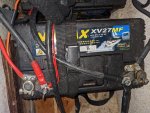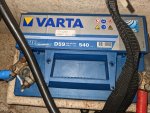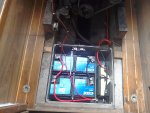Babylon
Well-known member
I wasn't a happy bunny when I got to the boat yesterday to run the engine etc, to discover that I'd foolishly forgotten to the isolate the domestic and engine circuits when last down in the Autumn, with the result that both banks were utterly dead (i.e. sub 3v). This is despite always leaving the Rutland wind-generator on when she's on her mooring. Also I didn't realise that with the engine key off and out and the domestic panel master switch also off that there'd be any residual drain?
But what is astonishing is the two Numax CVX27MF 95Ah sealed lead-acids which made up the domestic bank were fitted in Spring 2009, and the Varta D59 60Ah engine battery in Spring 2011! That the whole lot now needs replacing at a cost of about 300 nicker is annoying, but I don't think I can complain about their longevity!
The other factor that kept them in good shape, apart from the wind-generator and a VSR, is the fact that my boat has a very low electrical demand relative to the max 95Ah available (half the total) : few electronics (usually off), an extremely efficient fridge, incandescent cabin bulbs all replaced with LEDs, no telly, etc.


But what is astonishing is the two Numax CVX27MF 95Ah sealed lead-acids which made up the domestic bank were fitted in Spring 2009, and the Varta D59 60Ah engine battery in Spring 2011! That the whole lot now needs replacing at a cost of about 300 nicker is annoying, but I don't think I can complain about their longevity!
The other factor that kept them in good shape, apart from the wind-generator and a VSR, is the fact that my boat has a very low electrical demand relative to the max 95Ah available (half the total) : few electronics (usually off), an extremely efficient fridge, incandescent cabin bulbs all replaced with LEDs, no telly, etc.



